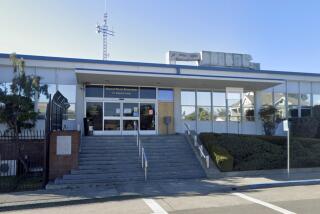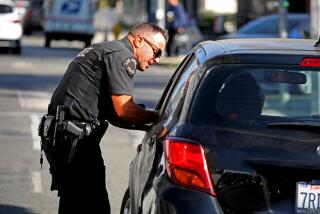Black Leaders Press Lockyer on Police Shootings
- Share via
One was a 19-year-old woman from Riverside. Another was a 18-year-old Claremont man pulled over for speeding. The third was a mentally ill homeless woman wandering near Hancock Park.
Their names are Tyisha Miller, Irvin Landrum and Margaret Mitchell--all African Americans fatally shot in Southern California by police officers over the last several months.
On Tuesday, African American civil rights leaders met with state Atty. Gen. Bill Lockyer to express their outrage, and press for the filing of criminal charges against the officers involved in the killings.
There is a “crisis in our confidence in the criminal justice system,” said Danny Bakewell, president of the Brotherhood Crusade. He was among more than three dozen men and women who met with Lockyer at the Brotherhood Crusade office at Slauson Avenue and San Pedro Street.
Lockyer defended the decision not to file criminal charges in the Miller case, saying that the police officers’ conduct “didn’t rise to a criminal violation.” Miller was shot by four officers in December when she was startled awake in her parked car and reached for a gun in her lap.
The decision was based on the unanimous findings of a committee of 12 prosecutors and civil rights attorneys, he said.
Lockyer added, however, that his office and the U.S. attorney’s office are continuing to investigate aspects of the case.
He said attorneys in his office have begun to assess what, if anything, should be done in the Mitchell shooting. The 55-year-old woman was fatally shot last month by an officer after she refused to answer questions about her shopping cart full of possessions and then allegedly lunged at the officer with a screwdriver.
He said he didn’t know much about the case of Landrum, who was fatally shot in January after he reached for a weapon after a police officer had stopped him for speeding.
Community leaders also called for more state and federal oversight of police misconduct investigations.
“It’s unrealistic . . . to expect any local police department to adequately investigate itself,” said John Mack, president of the Los Angeles Urban League. Investigations by prosecutors also are tricky because they need to keep a working relationship with police, he said.
Others at the meeting included leaders from the NAACP, the Black Women’s Forum, Congress of Racial Equality, the Black American Political Assn. of California and Rainbow Push Coalition.
More to Read
Sign up for Essential California
The most important California stories and recommendations in your inbox every morning.
You may occasionally receive promotional content from the Los Angeles Times.










